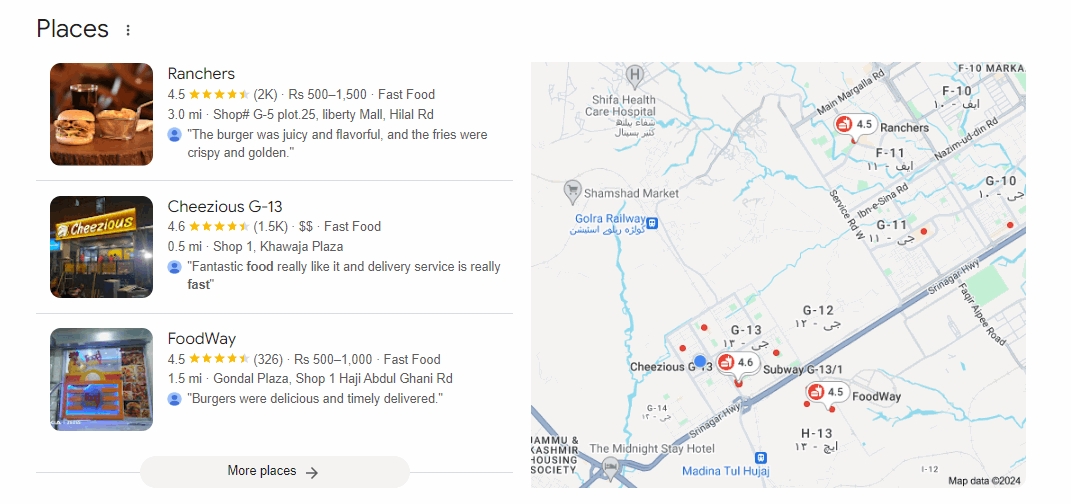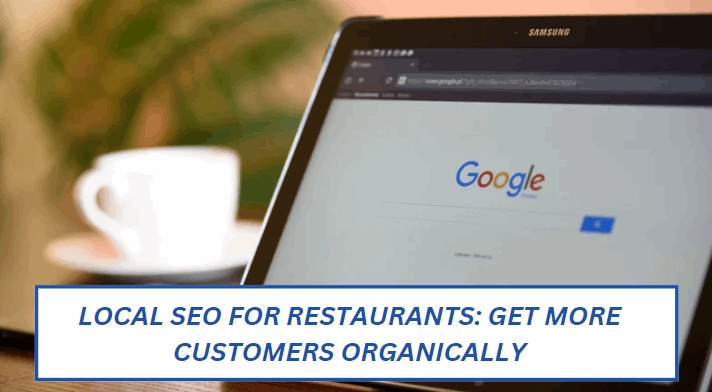If you’re a restaurant owner, you probably know that getting new customers through the door is all about being visible. Your restaurant’s online visibility heavily depends on your SEO strategy. If you want to attract hungry customers searching for phrases like “Best pizza near me” or “Best sushi restaurants near me”, you want a comprehensive SEO strategy. But, what exactly is local SEO and how can you go about using it to drive consistent traffic and leads to your business? This blog post covers all key aspects of local SEO for restaurants so that you don’t have to hop from one resource to another to find relevant information. Let’s dive in.
The Importance of Local SEO For Restaurants
Before diving into the practical part of local SEO for restaurants, you need to know why it’s so important. It’s crucial because it helps you reach your target customers searching for businesses like yours on Google and other search engines. Most of them turn to Google local search before visiting a restaurant nearby. According to research, 90% of diners look for restaurants online before visiting them.

An effective local SEO strategy ensures your restaurant website and GBP gets in front of them when they search for restaurants on Google.
Crucial Local SEO Strategies for Restaurants
Here’s a step-by-step guide on how you can make your restaurant more visible to potential customers.
Google Business Profile Optimization
Start by creating your Google Business Profile (Previously Google My Business) if you haven’t already. Add all the important information about your business to your profile to help Google understand and rank it such as:
- Business name
- Phone number
- Website URL
- Menu details
- Service hours
- And other details
An optimized Google Business Profile leads to better visibility on Google Local Map Pack. It’s essentially the top three businesses related to the search term. Getting one of these three spots can boost the number of leads you get through organic search.
You May Also Like: How to Do Pinterest Marketing (A Comprehensive Guide)
Optimize Your Website with Local Keywords
Your next step should be to optimize your restaurant website’s important pages, such as the homepage and menu page, with relevant keywords. For on-page SEO, use these best practices:
- Add your primary keyword to all important sections of a web page (For instance, best sushi restaurant in “City name”)
- Use images with alt tags to rank them on Google Images
- Use external links to add credibility to your content
- Link internal pages on your site to add context and pass link juice/authority
Make sure each page on your website is optimized for user experience, search engine bots, and user intent. This will not only help you rank them on Google’s first page but can also improve the chances of converting visitors into leads or customers.
Build Citations on Local Directories
Adding your business information and website link to local directories can help your business in two ways:
- It may add some authority to your website, potentially helping its Google visibility
- It could attract high-quality leads to your restaurants
Add your business information in generic and niche-relevant online directories to maximize exposure. These include, but aren’t limited to:
- Yelp
- TripAdvisor
- Zomato
- Yellow Pages
Optimize Your Site for Mobile
According to Google, 89% of people do dining research on their phones before visiting a restaurant.

This means if the mobile version of your restaurant website isn’t optimized for user-experience, it could hurt your business growth. Make sure your website is mobile-friendly by visiting it on a mobile phone. See if there are any user-experience elements that could be improved. You can use Google’s PageSpeed Insights to analyze your site’s performance on mobile and desktop.
You May Also Like: Copywriting Tips for Small Businesses (E.g., Restaurants)
Have an Internal Linking Strategy
Proper internal linking can help in two ways:
- keeping visitors on your website, increasing the dwell time and the chances of converting prospects into customers
- Passing the authority from one page to the other, increasing the ranking power of the receiving page
Using relevant internal links in all the right places can also help search engines understand your website’s structure and content, which can speed up the indexing and ranking process.
Get More Online Reviews
Online reviews have the power to make or break your business’s reputation. Try to get as many 5-star reviews on Google as possible. The quality of your food and customer service are major factors here. If someone likes your food and keeps coming back for more, politely ask them if they’d like to give feedback about their experience. You can make the review process easier for them by:
- Writing a rough draft for them to edit and personalize
- Sharing your review page link
- Creating and sharing a QR code that leads to your review page
Local SEO for Restaurants: FAQs
Let’s address some frequently asked questions about local SEO for restaurants.
Does SEO Work for Restaurants?
Yes, local SEO for restaurants works. In fact, it’s a crucial part of restaurant marketing because most of your target customers are searching for restaurants online, and local SEO is a perfect way to reach them.
How Much Does Local SEO Services Cost?
It depends on your business needs. Most aspects of local SEO, like optimizing your Google Business Profile and gathering reviews are cheap. If you want to invest in a managed all-in-one local SEO service, it could cost you $1000 or more.
How to Do Local SEO for Restaurants?
If you have the time and energy for do-it-yourself SEO, follow the steps outlined in this blog post. Alternatively, hire an SEO service provider to do it for you, in which case, you’d be investing money instead of time.
Related: Meta Ads vs. Google Ads: Which One’s Better for Your Business?
Conclusion
Restaurant SEO starts with understanding your business needs. If your Google Business Profile is already optimized, you don’t want to invest a lot of resources into it. Wherever you’re in your restaurant SEO journey, invest your resources to move to the next step. Start by finding the right keywords and optimizing your website’s most important pages with them. Build citations on relevant online directories and keep your business information consistent across all of them. Use internal linking to help search engines understand your site’s structure and keep visitors on your site for longer durations.




